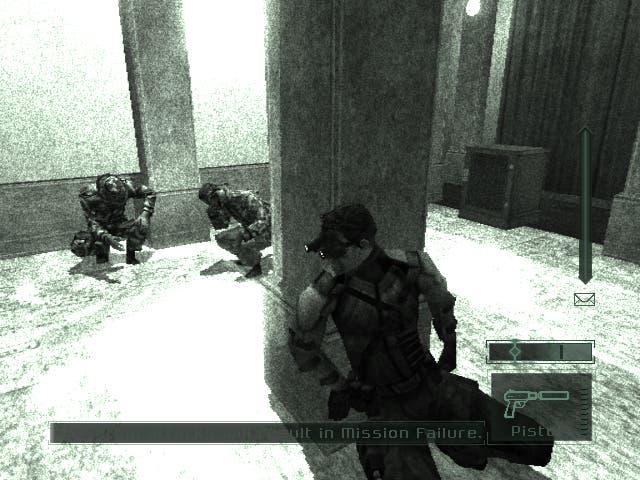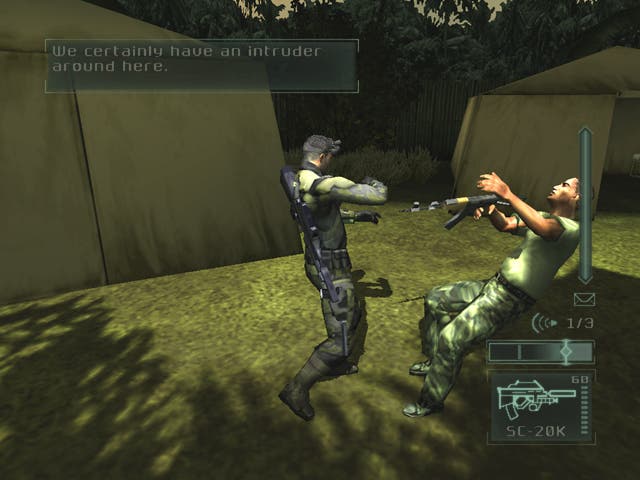Splinter Cell: Pandora Tomorrow
As PS2 ports go, this is as good as they get.
Order yours now from Simply Games.
In this era of multi-format releases, is there much point spending hours looking at numerous different versions of the same game? In the vast majority of cases the game's been designed at the lowest common denominator level - i.e. the PS2 - and every other format falls in line. It's the gaming equivalent of reviewing an audio CD, then the Minidisc, then the cassette version. It's becoming pretty pointless. But when a game like Splinter Cell: Pandora Tomorrow comes along on Xbox and PC first, we're always curious to see how Sony's increasingly ageing warhorse is keeping pace with its more powerful counterparts. The news for PS2 owners is good.
The first thing to note is, as ever, the visuals. Although the previous Splinter Cell port to PS2 was - at times - an approximation of the Xbox original, with a slower frame rate and less impressive lighting effects, it would be a picky man that levels the same accusations at this attempt. Although there's a disappointing lack of a PAL-60 mode (grrr), and no widescreen option (grrrrrrr), this is as good a conversion of Ubi's largely excellent stealth romp as anyone could reasonably expect, with some impressive technical trickery on show.
Tweaked to perfection

Once again PS2 owners get a slightly tweaked and ever-so slightly easier version than was released originally, not really as a result of any significant level or difficulty changes, but mainly as a result of the technical necessity to split the game up into slightly smaller chunks in order to work around the memory issues. In doing so, the check points come thick and fast, and therefore there's less reason to have to needlessly repeat long and tricky sections. If there was one issue we had with the Xbox version, it was the frustration factor getting past the handful of stupidly difficult sections that held up otherwise fairly steady progress - anything which smoothes those difficulty spikes is a good thing in our book.
Anyone remotely familiar with the original Splinter Cell will be instantly at home with the game mechanics, and it's a familiar tale throughout. You're once again Sam Fisher, grizzled Third Echelon rubber suit wearing perv and presumably former Marlboro man on a mission to uncover what's going on in East Timor. Unlike its stealthy rival Metal Gear Solid, the story's really not that big an issue here. For once, you can just get straight into the sneaking around, find the odd character to give you information, hack into the occasional computer and try to stay undetected throughout.
At its heart it's a very simple game, which this second play through reveals more fully. But like all the best games, it's got a wonderfully well realised play mechanic which serves it well all the way through. In Splinter Cell, it's all about how you use the light to your advantage, with the occasional use of sound to attract/distract guards as you see fit. Stalking around shooting the lights out is very much the order of the day, because in darkness you're more or less invisible to your foe - even when they've heard you rustling around first. Clicking on your night vision or thermal goggles gives you every opportunity to pop them right between the eyes and drag their limp bodies off into a corner where nobody will be any the wiser.
Easier, or just sensibly judged?

Of course, you can't expect to breeze through unchallenged, but the game generally gets by with a 'three strikes and you're out' system of alarms that reset as soon as you're beyond a predetermined section. Also, with a regular supply of medical stations, you're far less likely to be hobbling into a new section without enough health - as was so often the case in the original. For those you battled through the exceptionally harsh Xbox original (i.e, the 2002 original), this will probably seem far more playable - maybe even a little easy, but certainly nothing like as easy as the 'save anywhere' PC version, which many have reportedly blitzed through in a matter of hours. In truth, the PS2 version single-player campaign may take a little less time than the Xbox, but you're still talking about well over 12 hours for the average player. As a guide, the Xbox version took over 20 hours to crack, but that's taking into account this reviewer's inability to progress for hours in a few areas.
Apart from the alarmingly anticlimactic ending, and a general lack of new gadgets, weapons or moves, the eight mission long single player campaign is well worth playing all the way through and thoroughly varied in terms of its locales to keep dragging you along. However, compare this to the forthcoming Splinter Cell 3 and you can see exactly why we felt this was more of a glorified expansion pack in many respects than a true Splinter Cell sequel.
For many people, though, the online multiplayer more than made up for the single player shortfall - and it has made it intact to the PS2 version you'll be glad to hear. Sadly our review copy didn't allow us to log on, but as soon as Ubi provide us with a working copy we'll update this review to take into account how it compares to the Xbox version. By all accounts it should be exactly the same, in which case you'll be readying yourself for one of the most celebrated online experiences ever conceived.
Tension
Although in this era of massively multiplayer experiences a two-on-two stealth match might sound rather unexciting, it's actually one of the tensest, most perfectly balanced games around - totally unlike the single-player game. In simple terms you either play as the hunters or the hunted. The hunters play in first-person, the hunted - or the Sam Fishers - in traditional third-person, and you're basically given the task of either trying to defend an object/position, or going in and stealthfully nicking/destroying it. With three points to defend, you're always short-handed, and that's where it becomes a fantastic game of cat and mouse. The only problem, in truth, is that it's outrageously difficult to play against experienced campaigners that know the maps inside out and all the tricks. But against your equally (in)experienced mates, it's a fantastic way of experiencing stealth gaming multiplayer.
Order yours now from Simply Games.








